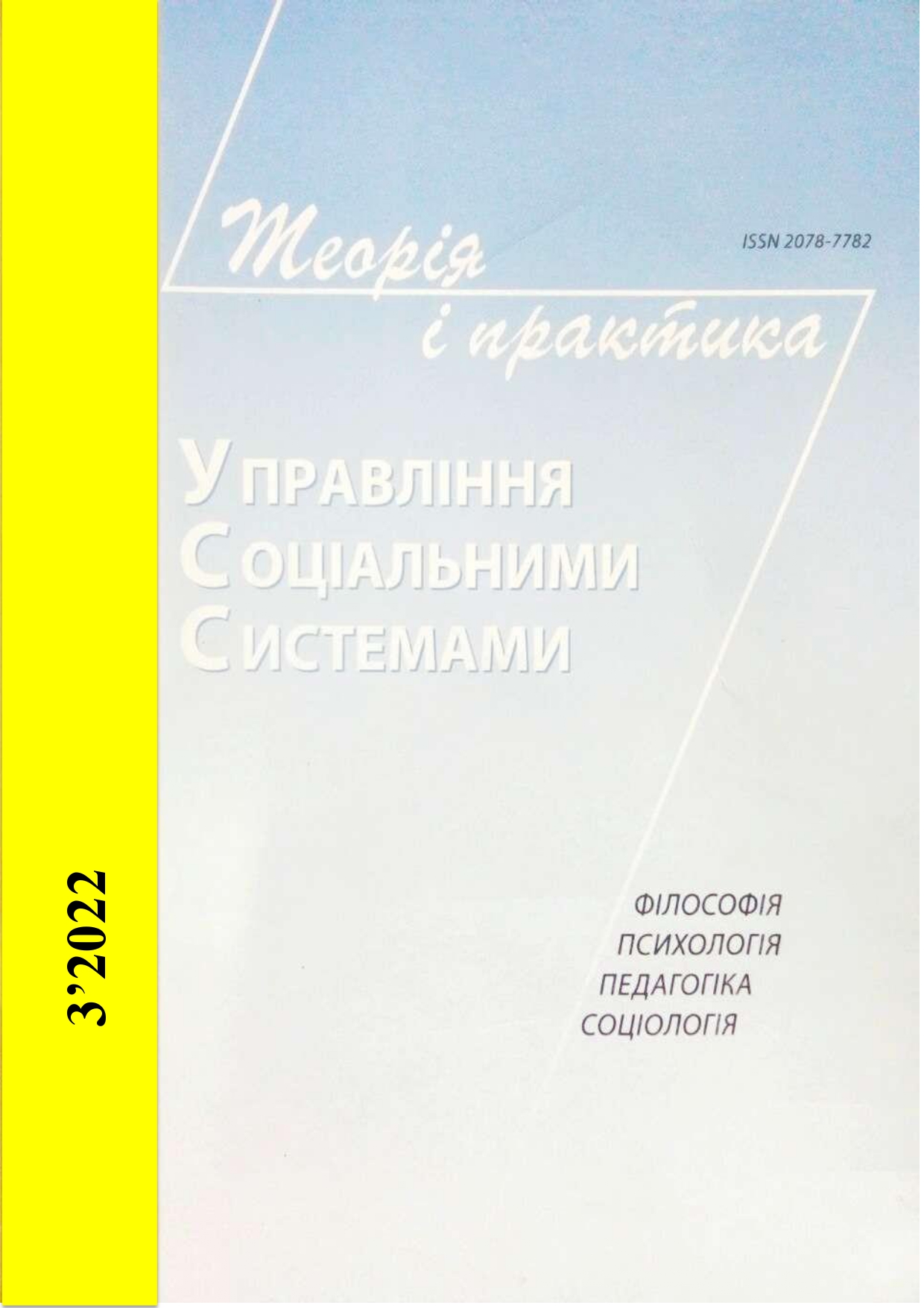ІСТОРІЯ РОЗВИТКУ СИСТЕМНО-ДІЯЛЬНІСНОГО ПІДХІДУ ДО НАВЧАННЯ
DOI:
https://doi.org/10.20998/2078-7782.2022.3.05Ключові слова:
методологічний підхід, діяльність, система, розвиток системно-діяльнісного підходу, вища освіта, системний підхід, діяльнісний підхідАнотація
Анотація. у статті розкрито значення понять “діяльність” і “система” як у загальному, так і в педагогічно-науковому контексті як інтеграційних компонентів системно-діяльнісного підходу до навчання. Мета статті – охарактеризувати поняття системно-діяльнісного підходу та описати його розвиток у застосуванні до навчального процесу. Акцент зроблено на історії розвитку системно-діяльнісного підходу.
Результати дослідження дозволили зробити висновок, що ідея поєднання системного та діяльнісного підходів належить не одному вченому, а зустрічається в ряді робіт філософів і психологів першої половини ХХ ст. Розгляд питань навчання та виховання дитини дав істотний поштовх розвитку цієї ідеї в 1960-1990-х роках. Нині досліджуваний методичний підхід до освітнього процесу доповнює інші методологічні підходи.
Посилання
Aksionova, N. I. (2012), “System and activity-based approach as the basis for the formation of meta-subject results”, Theory and practice of education in the modern world: Materials of international scientific conference (St. Petersburg, February, 2012), pp. 140-142
Asmolov, A. G. (1985), “Principles of organization of human memory: a system and activity-based approach to the study of cognitive processes”, A teaching aid, Moscow: Academy, p. 126
Basov, M. Ya. (2007), “The Development of a person as an active figure in his environment”, Psychological development, In the book M. Ya. Basov general foundations of pedology, Moscow: Aleteyya, p. 776
Biggs, J., Tang, C. (2011), “Train-the-trainers: Implementing outcomes-based teaching and learning in Malaysian higher education”, Malaysian Journal of Learning and Instruction, no. 8, pp. 1 – 19
Breunig, M. (2017), “Experientially learning and teaching in a student-directed classroom”, Journal of Experiential Education, no. 40 (3), pp. 213 – 230
Davydov, V. V. “Activity”, available at: http://rupedia.org/psiho/page/davyidov_vv__deyatelnost (Data of application: May 25, 2022)
Davydov, V. V. (1989), “Problems of developmental education: the experience of theoretical and experimental psychological research”, Moscow
Dalinger, V. A. (2011), “System and activity-based approach to teaching mathematics”, In Science and Epoch: monograph ed. O. I. Kirikova,Voronezh: VSPU, pp. 230 – 293
Dotsenko, S. O. (2016), “Implementation of system and activity-based approach in mathematics lessons”, Pedagogy and psychology, Kharkiv, issue. 55, pp. 52 – 63
Dusavitskyi, O. K. (2000), “The system of developmental learning in the mirror of school practice”, Bulletin of the Kharkiv National University, ser. Psychology. no. 493, pp. 16 – 21
Elkonin, D. B. (1971), “Psychological issues of the formation of educational activity”, Questions of the psychology of education and upbringing, Moscow
Elkonin, D. B. (1989), “Selected psychological works”, Moscow
Erikson, J. (1950), “Childhood and Society”
Feldshtein, D. I. (1994), “Psychology of personality development”, Moscow: Intern. ped. acad., p. 192
Fridman, L. M. (2003), “Psychology of children and adolescents”, Moscow: Publishing House of the Institute of Psychotherapy
Galperin, P. Ya. (1966), “The method of “Slices” and the method of the Theory of the stage-by-stage development of mental actions”, Questions of psychology, no. 4. pp. 132 – 137
Hegel, G. W. F. (1975), “Encyclopedia of philosophical sciences. Science of logic”, Moscow: Thought, v. 1, p. 452
Ilyenkov, E. V. (2019), “Col-lected works in ten volumes”, Moscow, Canon-plus
Kagan, M. S. (1974), “Human activity (Experience of system analysis)”, Moscow: Politizdat, p. 328
Karl Van Parreren C. F. (1990), “Leren op school [Learning in school]”, Groningen, WoltersNoordhoff
Khalid Mehmood, Wajiha Kanwal, Muhammad Naqeeb ul Khalil Shaheen (2021), “Implementation of activity based teaching at primary level: a theoretical perspective”, PJER, vol 4, issue 1, pр. 15 – 33
Kopnin, P. V. (1963), “Idea as a form of thinking”, Kyiv
Kostyuk, H. S. (1989), “Educational process and mental development of personality”, Kyiv
Kovalchenko, I. D. (2003), “Methods of historical research”, Moscow: Nauka, p. 486
Lektorskyi, V. A., Sadovskyi V. N. (1960), “On the principles of systems research”, Questions of philosophy, no. 8, pp. 49 – 54
Leontiev, A. N. (2005), “Activity. Consciousness. Personality”, Moscow, p. 352
Leontiev, A. N. (1974), “Fundamentals of the Theory of Speech Activity. Moscow. pp. 5 – 20
Milnikova, N. (2015), “System-and-Activity-Based approach in teaching to primary schoolchildren”, Primary Education, 3 (1), pр. 42 – 48
Roberts, J. W. (2014), “Beyond learning by doing: Theoretical currents in experiential education”, Routledge
Romitsyna, L. V. (2020), “Activity-based approach to teaching mathematics to students: the development of future-oriented thinking”, Innovative pedagogy, vyp. 27, pp.74 – 77
Rubtsov, V. V. (2008), “Socio-genetic psychology of developing education: activity-based approach”, Moscow: MGPPU
Rubinstein, S. L. (1922), “The principle of creative amateur performance”, Scientific notes of the higher school in Odessa, vol. 2
Sharma Sonal, Kumar Rakesh (2018), “Activity based learning system in higher education: a student centred approach”, International Journal of Social Science, no. 7 (4). pр. 469 – 474
Vorontsov, A. B., Chudinova E.V. (2004), “Educational activity: introduction to the system of D. B. Elkonin – V. V. Davydov”, Moscow
Vyhotskyi, L. S. (1991), “Pedagogical psychology”, Moscow
Yudin, E. G. (1978), “System approach and principle of activity. Methodological problems of modern science”, Moscow
Zankov, L. V. (1999), “Selected pedagogical works”, Moscow: House of Pedagogy, p. 608
##submission.downloads##
Опубліковано
Номер
Розділ
Ліцензія
Авторське право (c) 2022 Людмила Голубнича, Людмила Зеленська

Ця робота ліцензується відповідно до Creative Commons Attribution-NonCommercial-NoDerivatives 4.0 International License.
Автори, які публікуються у цьому журналі, погоджуються з наступними умовами:- Автори залишають за собою право на авторство своєї роботи та передають журналу право першої публікації цієї роботи на умовах ліцензії Creative Commons Attribution License, котра дозволяє іншим особам вільно розповсюджувати опубліковану роботу з обов'язковим посиланням на авторів оригінальної роботи та першу публікацію роботи у цьому журналі.Автори, які публікуються у цьому журналі, погоджуються з наступними умовами:

